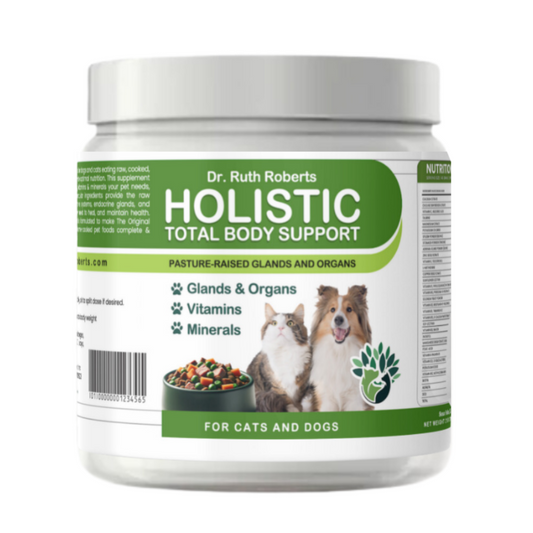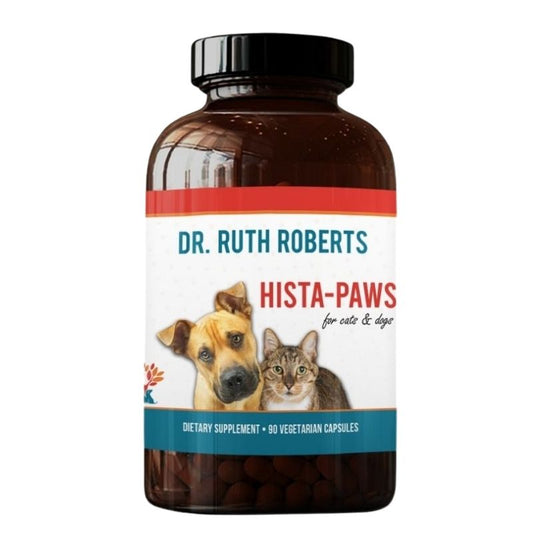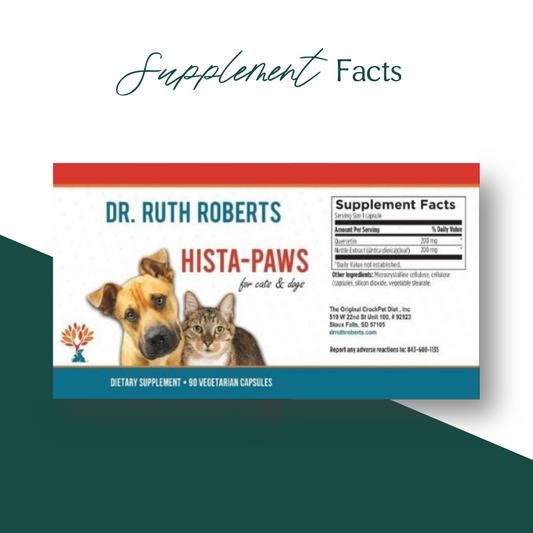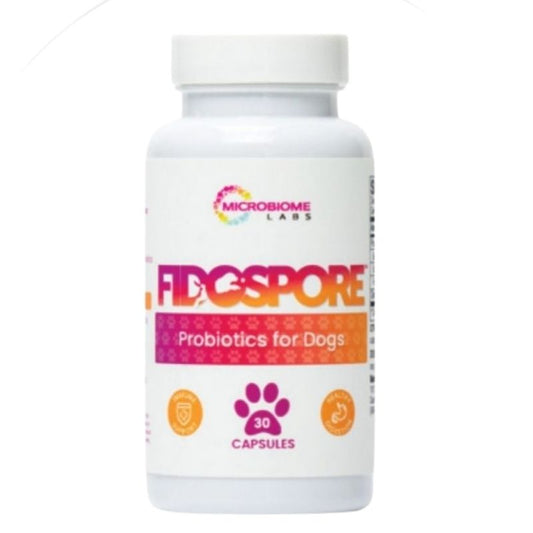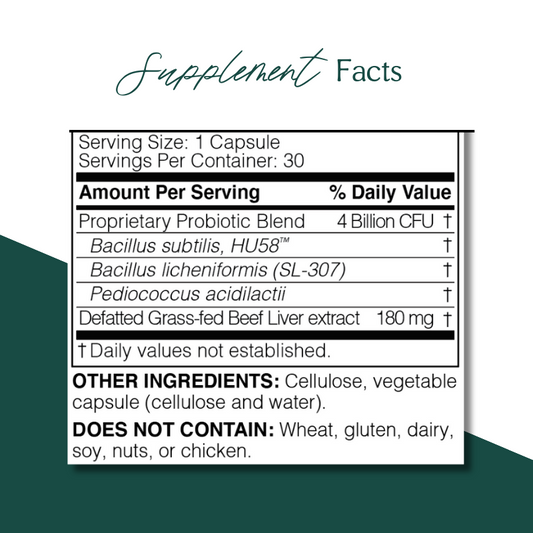
Cardiovascular Support
Heart illness, also known as cardiac disease or heart disease, can affect our beloved furry companions just like it can affect humans. It's crucial for pet owners to be aware of the signs, risk factors, and potential treatment options for heart-related conditions in both cats and dogs.
Since heart illness can be congenital (existing at birth) or acquired (develop over time), even pups and younger dogs may have cardiac problems. Dr. Ruth Roberts created a support protocol to help your pet, providing valuable insights into managing and supporting pets with cardiac issues.
No matter what type of cardiac issue your dog has, it's critical to recognize the early warning symptoms. Treating them as soon as they appear is easier. I use the products below for all my consulting clients, to get fantastic health outcomes.
-
Holistic Total Body Support for Cats and Dogs - Glandular Supplements
(42)Regular price $64.00 USDRegular priceUnit price perHolistic Total Body Support for Cats & Dogs is a premium pet multivitamins designed to support your pet's overall health and wellness. This powerful formula is crafted with the finest ingredients, including glandular tissue extracts, digestive enzymes, and immune-boosting nutrients, making it the perfect way to keep your pet feeling happy, healthy, and full of energy. This all-natural multivitamin used glandular extracts contains nutrients from healthy beef and pork organs and glands sour...
-
Hista Paws - Herbal Allergy Supplement for Cats and Dogs
(42)Regular price $42.90 USDRegular priceUnit price perLooking for a natural and effective solution to alleviate your pet's allergies? Hista Paws with Quercetin and Nettles is the perfect solution! Our herbal allergy supplement is specially formulated for cats and dogs, and contains a powerful blend of natural ingredients that work together to soothe and relieve allergy symptoms. Quercetin, a natural flavonoid found in fruits and vegetables, helps to block the release of histamines in the body, which are responsible for triggering allergy symptom...
-
The Original Crockpet Diet™ Recipes Course
(42)Regular price $49.00 USDRegular priceUnit price per$97.00 USDSale price $49.00 USDUnleash the Chef in You for a Healthier, Happier Pet Are you tired of commercial pet food options that leave you guessing about what's really in your fur baby's bowl? Take control of your pet's nutrition with our comprehensive self-paced course! What You'll Learn🌟 TOCPD Cooking Essentials: Master the art of crafting balanced, nutritious homemade meals for your pets. Discover rotation diet templates tailored for both cats and dogs, ensuring a well-rounded diet. 🐶 TOCPD For Dogs: From succule...
Sale -
Fidospore by MicroBiome Labs - Digestive Probiotic for Pets
(42)Regular price $43.99 USDRegular priceUnit price perFidospore by Microlabs is a premium digestive probiotic designed to address a common issue among pets: digestive problem. This powerful formula is packed with beneficial probiotics that work to restore the balance of healthy gut bacteria in your pet’s digestive system. Fidospore is easy to administer and safe for all breeds of dogs and cats. Simply sprinkle the recommended amount onto your pet’s food, and let the probiotics work their magic. With regular use, Fidospore can help to improve you...
-
Breathe - Heart and Respiratory Supplements for Dogs
(42)Regular price $49.99 USDRegular priceUnit price perYour furry best friend deserves the very best, and that's why we're proud to introduce Breathe - the heart and respiratory supplement for dogs that's unlike anything else on the market. Our unique formula contains a proprietary water extract of Cordyceps, Reishi, Artist Conk, and Chaga, along with the powerful adaptogen Ashwagandha. These ingredients work together to provide various benefits that can help improve your dog's overall health and well-being. Cordyceps is known for supporting hea...
-
Omega Pawz - Liquid Fish Oil Supplement for Pet’s Energy Booster
(42)Regular price $37.82 USDRegular priceUnit price perBoost your pet's energy and overall health with Omega Pawz by Dr.Ruth Roberts. Our premium fish oil supplement is packed with omega-3 fatty acids, EPA, and DHA to promote healthy skin, coat, and joint function, improved memory, cardiovascular health and more! Our liquid formula is easy to administer - simply add a few drops to your pet's food or water each day. Unlike many fish oil supplements, Omega Pawz is made with pure, high-quality fish oil and is free from artificial additives and prese...
-
MegaSporeBiotic™ - The Best Gut Health Supplements for Pets
(42)Regular price $72.00 USDRegular priceUnit price perMegaSporeBiotic™ is the best solution for pet owners looking to improve their pet’s gut health. This powerful spore-based probiotic supplement is specially formulated to target bloating, diarrhea, and other digestive issues. Featuring a unique blend of 5 Bacillus spores, MegaSporeBiotic™ helps to restore the balance of beneficial bacteria in the gut, supporting healthy digestion and immune function. In addition to its digestive benefits, MegaSporeBiotic™ can also help reduce inflammation and ...
-
The Complete CrockPET Diet Kit - Holistic Natural Dog Food
(42)Regular price $206.84 USDRegular priceUnit price perPrioritize your pet's well-being with The Complete CrockPET Diet Kit - Holistic Natural Dog Food. This resource is ideal for pet owners who desire a long, healthy life for their furry companions—offering an ultimate CrockPET Diet® that is formulated by dr Ruth Roberts and packed with all the nutrients your dog. By utilizing The Original CrockPET Diet® and the kit's supplements, you can provide your pet with delectable and nutritionally adequate meals. When you purchase this starter kit, you'l...
let's learn more about
Heart Disease in Pet
Heart disease, also known as cardiac disease, can affect our beloved furry companions just like it can affect humans. It's crucial for pet owners to be aware of the signs, risk factors, and potential treatment options for heart-related conditions in both cats and dogs. In this article, we'll explore common types of heart diseases,their symptoms, and how to support pets with cardiac issues for a
healthier and happier life.
Common Cause of Heart Disease in Pet
Age: Older pets are more susceptible to developing cardiac issues.
Breed: Some breeds are genetically predisposed to specific heart conditions.
Obesity: Excess weight can put strain on the heart.
Lack of Exercise: Insufficient physical activity can lead to weakened heart muscles.
Dental Health: Poor dental hygiene has been linked to heart disease in pets.
Common Symtoms of Heart Disease in Pet
The signs of heart illness can vary depending on the specific condition and the severity of the disease. Common symptoms in both cats and dogs may include:
- Coughing, especially at night or after exercise
- Labored breathing or rapid breathing
- Fatigue and reduced exercise tolerance
- Swollen abdomen (ascites) in severe cases
- Irregular heartbeat or palpitations
- Fainting or collapsing (more common in advanced stages)
Types of Heart Disease in Pet
Congestive Heart Failure (CHF):
- CHF occurs when the heart is unable to pump blood effectively, leading to fluid buildup in the lungs or abdomen. It is a common condition in both dogs and cats.
Hypertrophic Cardiomyopathy (HCM):
- This is a specific type of heart disease that primarily affects cats. It involves thickening of the heart's walls, which can lead to impaired heart function.
Dilated Cardiomyopathy (DCM):
- DCM is more common in dogs, especially certain breeds like Doberman Pinschers and Great Danes. It involves the enlargement and weakening of the heart chambers, leading to reduced pumping efficiency.
Mitral Valve Disease:
- This condition is often seen in small breed dogs, where the mitral valve in the heart becomes compromised, leading to regurgitation and eventual heart failure.
Relief and Support
While some heart diseases in pets are not curable, they can often be managed with proper veterinary care and lifestyle adjustments. Treatment options may include:
- Medications and supplementation to support heart function and manage symptoms.
- Specialized diets to reduce sodium intake and support cardiac health.
- Veterinary check-ups and monitoring of heart function.
- Maintaining a healthy weight through diet and exercise.
- Providing a low-stress environment for your pet.
See More Pet Protocols
Contact Us!
If you need help with selecting products for specific conditions, please don’t hesitate to contact us via call/text at +213 394 2923 / email drruthroberts@drruthroberts.com

